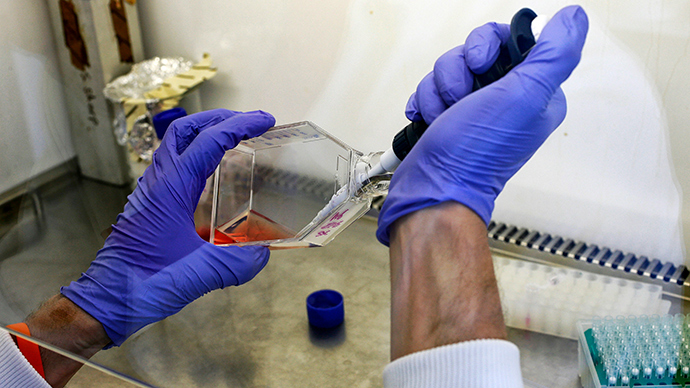Cancer cure? Scientists discover ‘unknown’ immunity boosting protein molecule

A “game changer” protein that promotes the body’s immunity to cancer has been discovered by scientists, offering fresh hope the often deadly disease will be conquered in years to come.
Researchers at Imperial College London discovered a “completely unknown” molecule, proven to improve the body’s immune system to fight off chronic illnesses.
The protein has been branded “unknown” because it doesn’t resemble any other protein, nor does it have a known function.
Researchers say the discovery could “open the door” to new therapies, and might potentially defeat cancer and other deadly viruses.
READ MORE: Cancer breakthrough: Kansas researchers testing compound that inhibits tumours
When a person develops cancer, the body fights the deadly virus with T cells, although it often loses the battle.
However, a protein called lymphocyte expansion molecule (LEM) allows the body to produce enough T cells to potentially overcome cancer and other viruses.
The protein was discovered while mice with genetic mutations were being screened. The test revealed that mice with a specific mutation made 10 times the number of T cells. It linked to the protein, which also exists in humans.
The experiments in mice and human cells have proved the protein promotes the proliferation of cytotoxic T cells.
Scientists hope to begin trialing a new genetic therapy on humans in three years, the Daily Telegraph reports.
Professor Ashton-Rickardt, from the Section of Immunobiology in the Department of Medicine at Imperial, who led the study, is certain this discovery could be a “game-changer.”
He says the new protein has the potential to treat “a number of different cancers and viruses.”
Rickardt says the discovery is “exiting” as they have unveiled a “completely new way” to use the immune system to defeat cancer.
READ MORE: 50% of Brits will get cancer, new research finds
Dr Mike Turner, head of infection and immunobiology at The Wellcome Trust, says the discovery is “fascinating.”
However, Turner argues that before the protein is tested on humans, a “further investigation in animal models is needed.”
“There is potential for a new type of treatment that capitalizes on the immune system’s innate ability to detect and kill abnormal cells,” he added.
Dr Alan Worsley, senior science information officer at Cancer Research UK, says the test on mice is “exiting”, although it only looked at one type of cancer.
“Cancer often finds a way to suppress the immune system, but drugs that overcome this and allow immune cells to target cancer show great promise,” he added.
To develop “more effective treatments” Worsley says more research should be done into the biology of the immune system, as it could increase the number of cancer-killing immune cells.
Worsley says the researchers should now “figure out how to develop drugs that target this molecule” and investigate whether doing so would be effective and safe in cancer patients.
The discovery follows the unveiling of a new treatment being tested at the University of Kansas that could defeat cancer.
Dr Liang Xu and his team of researchers spent three years testing a chemical cocktail, which inhibits a naturally occurring protein called HuR.
The inhibitor was tested on lab cultures in mice and has been successful against the deadliest types of cancers.
Dr Xu said the inhibitor is a “very promising” treatment which could “potentially lead to a new therapy for cancer.”












